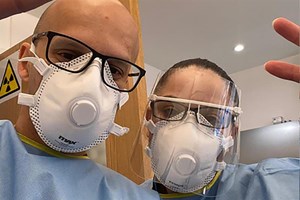The endodontic nurse and patient care
Published: 01/05/2014
Endodontic nurses are becoming highly specialised and more involved in every stage of treatment before, during and after surgery, and their essential role as part of the endodontic team is continuing to grow
Root canal treatment is probably one of the procedures patients fear most. Patients usually visit the endodontist through necessity rather than choice and consequently their treatment begins upon entering the surgery, as soon as they are greeted by the nurse or receptionist. With often only a short time to make the patient feel comfortable, it is vital that an endodontic nurse is able to both empathise with the patient and adopt a friendly and reassuring approach.
Patient-centric approach
Endodontic patients tend to be acutely attuned to any tension in the dynamics between nurse and dentist and maintaining a positive working relationship can help to avoid communicating any stresses that may exist.
Unlike other dental specialisations, such as cosmetic dentistry, endodontic patients are in pain and have usually been referred to the specialist by their general dentist. The endodontist does not have the benefit of the long-term relationship and understanding that the patient may have enjoyed with their own dentist. As a result, ensuring a calm and friendly atmosphere during the endodontic procedure is both important and beneficial.
Keeping order
A competent endodontic nurse will be well prepared in the surgery, having everything that may be needed for the procedure both organised and ready in advance. This preparation beforehand, coupled with an understanding and the ability to pre-empt what the dentist requires during the procedure, can make a big difference. One useful method is to prepare both a nurse's, as well as a dentist's, tray for each patient.
Endodontic nurses must also be highly aware of risks. Extreme care should be taken when making up chemical syringes, plus ensuring that bleach does not come into contact with clothing. By remaining focussed and not making mistakes, the very undesirable after-effects that can occur when something goes wrong, can be avoided.
Given the level of knowledge required in the endodontics field, it is perhaps hardly surprising that nurses practising endodontics in the future will be as specialised as orthodontic nurses.
Following treatment
The endodontist will usually give advice about aftercare. By being fully aware of what this advice entails, the nurse will be able to repeat, clarify and if necessary, reinforce anything that the patient may be unclear about.
In the event of the patient having any concerns, they will always be advised to call the practice, particularly if there is pain or swelling. The patient should also be informed of whether additional visits are required and about the timing of a permanent restoration.
Patients may be prescribed antibiotics or may be taking painkillers and appropriate advice will need to be provided. Whatever the situation, it is important to reassure patients and ensure they know that they can call the surgery if there is a problem.
As endodontic nurses become more highly specialised and involved in every stage of treatment before, during and after surgery, their essential role as part of the endodontic team will continue to grow.
Author: MA Healthcare











.jpg?width=150&height=100&scale=canvas)

